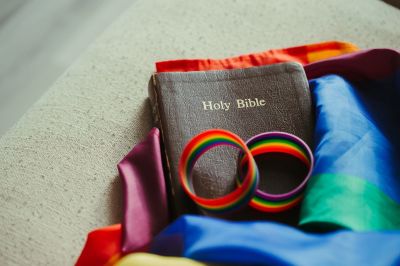
As someone who once lived and identified as a homosexual man but who has been transformed by Jesus Christ, I’m burdened by an insidious, neutered gospel that has heavily infiltrated many Evangelical churches.
It’s called “Side B” Christianity, and its proponents have for many years pushed a set of deceptive doctrines about human sexuality.
For those who don’t know what “Side B” means, Tim Keller described it like this: “People attracted to the same sex, though remaining celibate in obedience to the Bible, still can call themselves ‘gay Christians’ and see their attraction as part of their identity which should be acknowledged like one’s race or nationality.”
This was in contrast to “Side A,” which fully affirms homosexuality. The Side A versus Side B debate emerged years ago among some who were grappling with identity questions, with one side saying it’s fine to embrace one’s same-sex sexuality and the other side saying it must be resisted while simultaneously asserting that same-sex sexual desires cannot and should not be counseled to change. Both Side A and Side B view the sanctifying power of God’s grace as an attempt to “pray the gay away” or “conversion therapy.”
Side B’s insidious nature is that it speaks in loving tones but leaves its hearers in chains, claiming to be biblically faithful while subverting the heart of the Gospel. This false distortion is taking my home state of Minnesota by storm and it’s poisoning the whole Body of Christ.
Case in point, at the recent “Exiles in Babylon” conference hosted by Pastor Dave Brickey at Church of the Open Door in Maplewood, Minn., a wave of Side B ideology was presented to attendees under the guise of “compassionate missiological Christianity.” The idea is best explained by the group Posture Shift’s mission, “writing a new church history where communities of faith and homes are safe for LGBTQ+ family and friends.” This approach of missional ministry attempts to practice relational engagement and inclusion of LGBT identity into the church body.
But the Side B view and its praxis are nothing short of theological malpractice because it is built upon a false anthropology and a false ontology. Scripture teaches that we are created male and female (Genesis 1:27) and that our identity is not in our temptations or struggles but in Christ alone (2 Corinthians 5:17). Side B Gay Christianity redefines the self according to desires and feelings and then baptizes those desires in religious sexual orientation language.
Why the Gospel is undermined
Side B theology does not confront the Church with the open defiance seen in progressive movements, such as rainbow flags waved at Pride parades. Instead, it operates subtly, often emerging from pulpits that otherwise hold to theological orthodoxy. It appeals not to sound exegesis but to emotion, personal narratives, and therapeutic language. Prominent voices such as Christian psychologist Mark Yarhouse are frequently cited to support views on identity that are not grounded in Scripture. These appeals often masquerade as empathy but amount to emotional manipulation rooted in sentimentalism rather than biblically rooted compassion.
One common method used by Side B proponents is the “empty chair” presentation. A speaker shares the “lived experience” of an LGBT-identifying person while pointing to an empty chair, representing the absence of such individuals in the Church. The audience is then invited to lament that absence, implying that the Church has failed these individuals. While this appears compassionate, Proverbs 18:17 warns us: “The first to plead his case seems right, until another comes and examines him.” This technique, steeped in emotionalism, subtly replaces sin with sorrow and identity with injury. The narrative often omits why that person adopted an LGBT identity in the first place, or what repentance would mean.
The result is a theological bait-and-switch. Congregants enter believing the LGBT identity is distorted. They leave emotionally softened, grieving the absence of someone they are now primed to see not as a sinner in need of transformation, but as a victim who must be affirmed. The language of compassion has masked a shift from viewing LGBT identity as a behavior and desire to be repented of, to seeing it as an immutable, ontological reality — an identity to be embraced. This psychologically disruptive sleight of hand has deceived many, even in some of the largest Evangelical churches in Minnesota.
When pastors adopt or endorse Side B theology, they do more than accommodate an unbiblical view — they suppress the hope of transformation. They withhold the power of the Gospel from those crying out for freedom. Instead of proclaiming Christ’s power to redeem and sanctify, they leave sinners in bondage, effectively declaring that God has no more to offer.
What does it say to men like me when a pastor tells others that transformation in one’s sexuality is not possible, or worse, not to be expected? It says: “Your story of sanctification doesn’t matter, but rather, what matters is the experience of those who have not experienced freedom or healing. Let’s show empathy to the one who is unable to be set free. Stop the stigma of change, do not call them to freedom in Christ, but help them to not act out on it and affirm their gay celibate identity.”
Side B theology also teaches that homosexual desires are permanent and central to one’s identity, but that acting on them is sinful. What’s the “solution”? Side B proponents say it is lifelong celibacy, not sanctification and transformation.
This view denies one of the most precious truths of the Gospel: that Jesus doesn’t just forgive sinners, He makes them new creations. As the Apostle Paul famously said, “Such were some of you; but you were washed, but you were sanctified, but you were justified…” (1 Corinthians 6:11, NASB 1995). By refusing to uphold “were sanctified,” Side B offers a truncated Gospel where sinners remain defined by their old desires even as they claim Christ. This is the false anthropology at the heart of Side B: that being “gay” is the defining trait, rather than a struggle to be laid at the foot of the cross.
The Gospel is for the whole person
The most destructive error of this theology is that it gives sexual desires a rigid ontological status, that being same-sex attracted or “gay” is a fixed category of personhood. This creates a spiritual caste system where an elite, unchanging sexual minority must be related to and catered to on their own, self-defined terms — the “Gay Christian” (but celibate!). But this is antithetical to the Gospel! It is not “gay people” who need a different kind of discipleship; it is sinners — all of us — who must be born again (John 3:3).
Side B advocates will ask questions like “What would you do if you were me?” But they never answer the deeper question: Who does God say we are?
The damage of Side B and motte-and-bailey tactics
Perhaps worst of all, Side B implies that God is unwilling or unable to transform certain sins, particularly the LGBT variety. This theology deeply wounds those of us who have experienced the genuine freedom God has brought to us, as it suggests that the blood of Christ is strong enough to cleanse but not enough to change us. Furthermore, its proponents often employ misleading motte-and-bailey tricks, mixing truth with lies. Side B advocates are often quick to retreat to the “motte” of theological orthodoxy: “We still believe sex is only for marriage between a man and a woman.” But the “bailey” is that false ontology, that being “gay” is a fundamental, God-ordained aspect of one’s identity, and a false anthropology, that sexual desire defines the core of who we are, not what we do. They pull a strategic, sinister, spiritually manipulative maneuver. They will defend themselves by appealing to belief in historic Christian sexual ethics while infusing it with unbiblical views about who we are as persons, effectively pitting Genesis 1 against itself.
Biblical anthropology and ontology are not secondary or tertiary doctrines. They are first-order teachings, cornerstones of our faith. The image of God in man and woman is not compatible with modern psychological sexual identities that arise from the Fall. To say that a person is “gay” in their core self not only denies the foundational teaching in Genesis but contradicts the entire trajectory of redemptive sanctification through all of Scripture.
To the confused believer who may be struggling, know this: you are not alone in your anguish. Your temptations do not define you. Your sexual desires are not your identity. You can be free. You can be transformed. You are not beyond redemption. Christ died to make you holy, not just celibate. You do not have to live as a spiritual orphan, fighting for scraps of healing and transformation. You are a child of God, and He will not withhold good from those who seek Him.
Side B Gay Christianity is regression, and it should be wholly rejected. It has a form of godliness but denies the power of God unto salvation. It’s the wisdom of men dressed up in religious clothing. Pastors should not patronize those who are crying out for freedom with Side B’s muted, lifeless promises and therapeutic slogans.
Sexual strugglers of every kind need the Gospel — the real, full Gospel — which sanctifies and sets captives (of all types of sin) free.
Daren Mehl is President of Voice of the Voiceless, a 501c3 ministry amplifying the ex-LGBT Christian testimony in the public square. Daren once lived as a “gay Christian” but has been set free by Jesus. He has been married to his wife Rhoda for 19 years and has two children. Daren and Rhoda have been called to Christian ministry full time. Daren is a Pastor at Warroad Community Church, Co-Founder of Made Free Ministries, Associate Director of Agape First Ministries, on the Board of Association of Christians in Health and Human Services, Operations Manager for The Alliance for Therapeutic Choice and Scientific Integrity, and a frequent guest or keynote speaker at churches and conferences. Daren has written a 12 Session Study Guide called “From Conformed to Transformed” exploring his testimony and 4 distinct doctrines related to LGBT. Daren can be reached at https://linktr.ee/darenmehl.

















